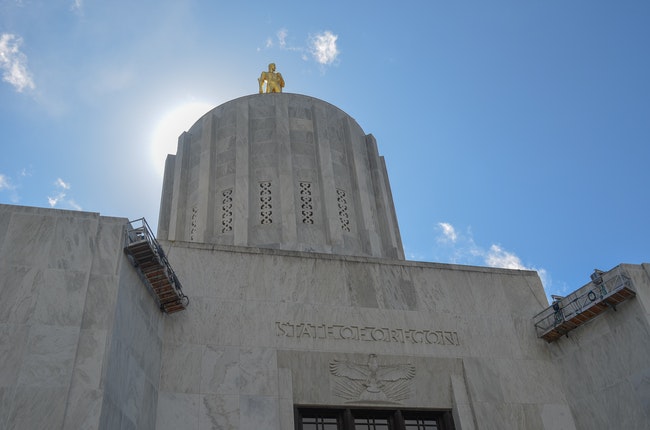
SALEM — A hay farmer, a high school student and a physicist each strode up to a modest hearing room table Tuesday evening to give lawmakers a piece of their mind.
That table was their stage for two minutes, their platform to tell policymakers to their faces what they thought of the Legislature’s ambitious plan to limit — then shrink — the state’s greenhouse gas emissions.
Cap and trade has a way of getting people to think about the future — what could happen to their wallets if it’s enacted, what could happen to their children and grandchildren if it’s not.
“This bill has put a panic through agriculture,” said Mickey Killingsworth, of the Jefferson County Farm Bureau. “And I have listened to people testify today …if this bill goes through…the impacts on agriculture are going to be severe.”
“I appreciate the work,” said Killingsworth. “I understand climate change. I just think this isn’t the way to do it.”
“I don’t pretend to fully understand cap and trade, but I understand young people,” said Carol Greenough of Tualatin. “I’ve worked with them all of my life. Some feel hopeless about their future, some are incredibly active to ensure that things get better, but all are scared that nothing will change. We owe it to them to do the best we can to lead in climate action. This bill does that.”
Testimony by dozens of Oregonians on Tuesday could be divided into two rough camps: the first, some farmers and industry lobbyists, who testified against the proposal. The second was environmental and other activists, who praised the proposal or urged lawmakers to include stronger measures than proposed.
Late Monday night, the Legislature had published a round of new changes to the proposal, which has weathered substantial modification from the version proposed last year, when it imploded amid Republican absenteeism.
Democrats are hoping to push through the plan by March 8, when lawmakers must adjourn the “short” legislative session customary in even-numbered years.
The proposal’s method for imposing regulations on fuel importers has been simplified, with companies importing fuels into the Portland metro area first to get regulated in 2022. In 2025, counties west of the Cascades, and Bend and Klamath Falls, would be included.
This version includes a job training program for Oregon workers to gain skills in the clean energy industry — an idea restored after being cut from previous versions — and would have a new state board create a program to provide financial help and home weatherization programs to people who use propane to heat their homes.
Separate legislation would create a tax credit for low- and moderate-income Oregonians who live in areas covered by the gasoline regulations, as well as refunds for off-road operations in agriculture and forestry.
By 2:30 p.m. Tuesday, a line of people stretched out of the hearing room and into the Capitol hallways where lobbyists trade intelligence. The crowd chattered as the clock ticked toward 3 p.m., when the session’s first public hearing on the cap and trade proposal was scheduled to begin.
Lawmakers used nearly the first couple of hours reviewing the multitude of changes to the policy with legislative counsel Maureen McGee before listening to testimony.
The crowd dwindled by 5:30 p.m., when the committee reconvened after a break to take more public testimony, each person’s thoughts split into efficient, rigidly enforced two-minute blocks. And by 7:30 p.m., when the hearing concluded, Hearing Room C was a far quieter place.
Despite some heated opinions, the overall mood of the hearing was fairly light, at a point in session where tensions are not yet running high. Sen. Arnie Roblan, D-Coos Bay, jokingly offered to make himself available for more testimony on Friday, which is in between days when the committee is scheduled to hear more from the public.
Tuesday evening was a mild preview of the potential excitement on Thursday, Feb. 6, when the activist group Timber Unity is expected to show up in full force at the Capitol to voice opposition to the proposal. Sen. Michael Dembrow, D-Portland, expects to allot 30 minutes for the group to testify.
The Senate Committee on Environment and Natural Resources is also holding a hearing on Saturday to allow people who work Monday-to-Friday schedules a chance to testify on the proposal.
Last to speak Tuesday night was Nora Lehmann, an artist, teacher and mom from Portland, and a member of PDX Families for a Livable Climate. She took a day off from work to come to the Capitol, and had to call in favors from friends to help with childcare, missing preschool pickup, dinner, bath, and bedtime.
“The fact that I am able to be here at all is a measure of my own economic privilege,” Lehmann said. “So while of course, I am here to testify on behalf of my own beloved children, Sally who is four, and Sydney who is two, I would also like to take this moment to advocate for the children of parents who don’t have the same privileges that I do. The parents who are too poor, too stressed, too on the edge to have any time or headspace to worry about climate change. Their sweet children also deserve a livable planet.”
About twenty seconds later, the timer went off, and she “requested, demanded, begged and implored” lawmakers to take action, prompting applause from the assembled public.
Dembrow grinned — but held up his hands to stop the clapping.
Reporter Claire Withycombe: [email protected] or 971-304-4148.









